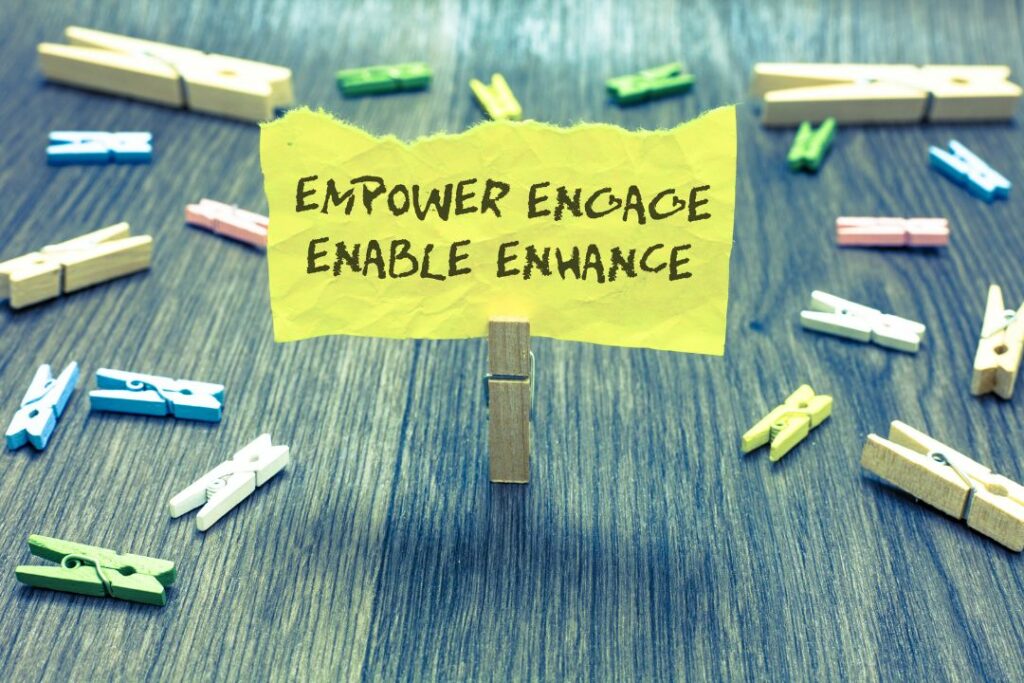Top 10 Employee Engagement Strategies for 2024

Employee engagement is more than just a buzzword; it’s the secret sauce behind thriving businesses. If you’re an HR manager looking to keep your teams motivated on a tight budget, read on for some cost-effective and actionable strategies to keep your workforce engaged and energised.
Cost-Effective Strategies to Boost Employee Engagement
1. How to Promote Work-Life Balance in the Workplace
Encouraging employees to maintain a healthy work-life balance is crucial. Ensure your team takes regular breaks, uses their holiday entitlement, and genuinely disconnects after work hours. Simple policies that promote rest and prevent burnout, like clear guidelines on after-hours communication and encouraging time off, can significantly enhance productivity and employee satisfaction. The Central Statistics Office (CSO) in Ireland conducted a “Personal and Work-Life Balance Survey,” highlighting the positive impact of flexible working arrangements on employee well-being and productivity.
2. Benefits of Flexible Working Arrangements for Employees
The rigid nine-to-five schedule is outdated. Offer flexible work options, such as remote work, flexible hours, or compressed workweeks. This flexibility helps employees manage their personal and professional lives more effectively, boosting job satisfaction and productivity. Use existing technology like video conferencing tools and project management software to facilitate remote work without additional expenses. Interestingly, Ireland ranks second for remote work opportunities, demonstrating the growing acceptance and benefits of flexible working arrangements.
According to RTE, Ireland has seen the largest increase in remote working within the EU, showing a significant shift towards flexible working.
3. Prioritising Mental Health and Wellbeing at Work
Mental health support is essential, especially for small to medium-sized companies. Provide accessible resources such as mental health days and promote wellness through initiatives like peer support groups, mindfulness sessions, or regular check-ins. Encourage open discussions about mental health to create a supportive environment where employees feel valued and cared for. The RTÉ report highlighted that improving work-life balance and supporting mental health are critical for employee well-being in Ireland.

4. Investing in Professional Development for Employees
Professional growth opportunities are a win-win. Offer training programmes, workshops, and clear career advancement paths. When budgets are tight, consider internal training sessions, peer mentoring programmes, or free online courses. When employees see that you are invested in their development, they feel more motivated and confident in their roles.
5. Recognition and Reward Programmes for Employee Engagement
Recognition and rewards are vital for maintaining high engagement levels. Implement informal recognition programmes like shout-outs in team meetings, personalised birthday cards sent to remote employees, or social media recognition. Celebrating milestones and achievements doesn’t have to be costly but can have a significant impact on morale.
6. How to Build a Strong Company Culture
A strong, positive company culture can make a world of difference. Cultivate an environment that values teamwork, inclusivity, and respect. Align your company’s values with those of your employees and ensure these values are reflected in everyday practices. Organise low-cost team-building activities like online lunches, volunteer days, or themed office days to reinforce these values.
7. Empowering Employees with Autonomy at Work
Giving employees control over their work can significantly boost engagement. Allow them to make decisions about how they complete their tasks and encourage them to take the initiative. This sense of ownership leads to increased creativity and motivation. Trusting employees and reducing micromanagement doesn’t cost anything but can dramatically improve engagement. Consider implementing self-service HR tools, such as those offered by HRLocker, to further empower your workforce.
8. Effective Communication Strategies in the Workplace
Effective communication is the backbone of employee engagement. Establish clear channels for communication between management and staff. Transparency in company goals, changes, and expectations builds trust and reduces uncertainty. Regular updates through emails, town hall meetings, or an internal newsletter can ensure everyone is on the same page.

9. Fun and Effective Team Building Activities
Team building activities can enhance relationships and collaboration among employees. Whether through social events, workshops, or team projects, these activities create a sense of camaraderie and teamwork, improving overall job satisfaction. Opt for low-cost activities like team sporting events like sponsored walks, online bingo, or collaborative volunteer projects to keep costs down while creating team spirit.
10. How to Collect and Act on Employee Feedback
Regularly seeking and acting on employee feedback shows that their opinions matter. Use free or inexpensive survey tools to gather feedback and hold feedback sessions to discuss the results. When employees see that their feedback leads to positive changes, they feel more valued and engaged.
Final Thoughts
Engaging employees is an ongoing effort that requires thoughtful strategies and consistent attention. Organisations can create a thriving work environment by promoting work-life balance, offering flexible work arrangements, prioritising mental health, investing in professional development, recognising achievements, strengthening company culture, empowering employees, maintaining open communication, organising team-building activities, and acting on feedback. These HR strategies not only boost employee satisfaction and create a more engaged and motivated workforce but also contribute to the overall success of your organisation.
